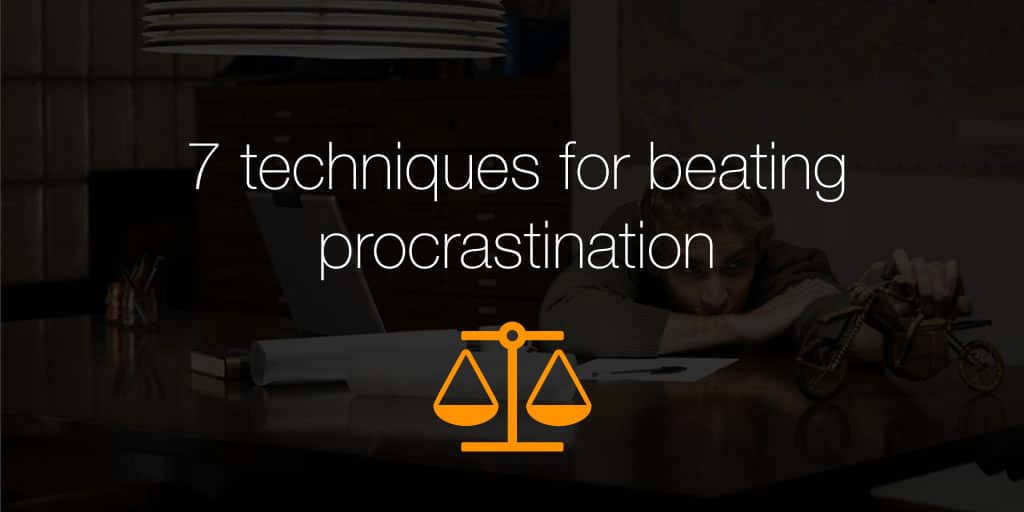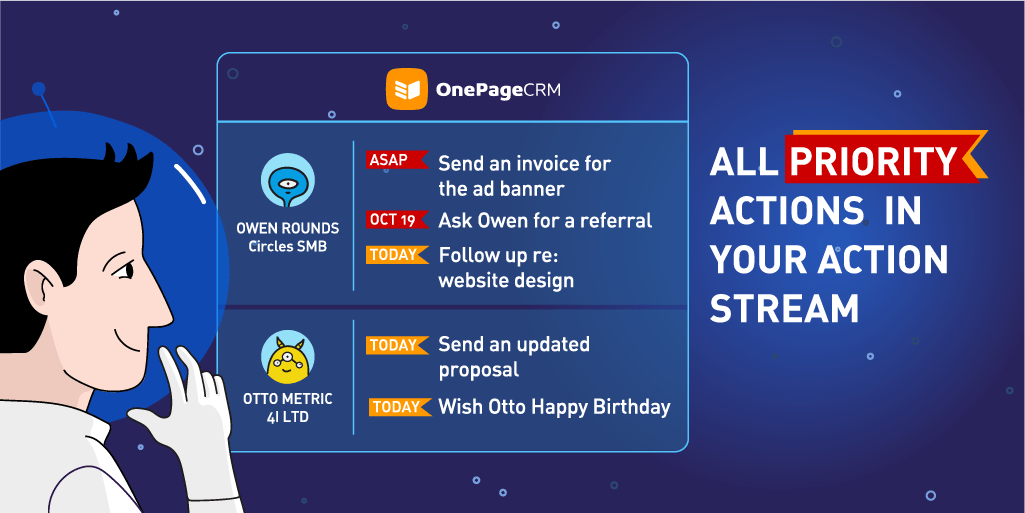

How to stop procrastinating: 7 simple techniques that work

Procrastination. At some point in our lives, many of us googled “How to stop procrastinating?”
We’ve all been there. You know you’ve got a hugely important task to do, but you just can’t get around to it.
There are days when you just can’t seem to get anything done, no matter how organized you usually are or how urgent the task is.
Why does this happen and what can you do about it?
Is procrastination always something bad?
Not really. We all do it.
“Everyone procrastinates, but not everyone is a procrastinator”.
To some extent, procrastination might be a healthy mechanism to avoid overstimulating your nervous system. Imagine if you always meet all deadlines, burnout is inevitable.
Of course, it’s not all roses and sunshine. There are some dangers to constant procrastination. It can harm your goals and make you feel like life is stagnated.
Sometimes it gets in the way of building the life or the career that you want to have. What if you are constantly procrastinating on launching a business? Moving to a new career opportunity?
Let’s dig deeper into the most common reasons why people procrastinate.
Why we procrastinate
Let’s face it—we are all guilty of procrastination.
Although there are myriads of time management techniques to battle procrastination, the closer the deadline is, the less likely these techniques will work.
There’s a simple explanation.
“Procrastination is an emotion regulation problem, not a time management problem.”
To address procrastination, we first need to understand why we do this.
And there are at least four reasons.
Reason #1: Poor emotion regulation
We all have this task that we don’t want to go near—it’s either difficult, stressful, time-consuming, or overwhelming.
But it can also be just very…boring, you know?
For example, drafting an email about some minor issue or scheduling a meeting to discuss the latest report.
You don’t want to do this. So you spend time on less urgent tasks and wait until the very last minute.
And ironically, avoiding stressful tasks usually results in more stress.
If a task is boring, frustrating, and unstructured and you don’t feel any sense of personal reward, you naturally won’t want to do it. Truth be told, we don’t procrastinate on things that we consider fun.
But if a task provokes negative emotions or feels overwhelming, it might be difficult to face it so we do the easiest thing: we choose to avoid it to avoid feeling these negative emotions.
Reason #2: Self-sabotaging
You might have heard about self-sabotaging before. It’s a behavior that prevents people from achieving their goals and dreams. And it’s tightly connected with low self-esteem.
In this case, you might choose to procrastinate to avoid being judged.
An article from the Association for Psychological Science (APS) lists a few other reasons why people just don’t get things done:
- They are concerned about how people will evaluate their work.
- Success may make people have higher expectations of themselves.
- They are happy just existing at their current level.
Reason #3: Overthinking
Sometimes procrastination comes from indecisiveness.
For example, you might have always dreamt about starting your own business. But there are so many options that you might feel lost and unable to make a decision. What if your decision is the wrong one? What if there’s no way back? What if…
There are lots of what-if scenarios that people ruminate over when they procrastinate. Sometimes it might seem like non-action is the best decision. Which is kind of a self-protective mechanism.
Reason #4: Planning failure
You know that sweet feeling of the adrenaline rush?
Some of us really enjoy it. But the truth is that if a deadline turns into an adrenaline race something probably went wrong along the way. Ideally, deadlines are there to give realistic expectations.
In many cases, procrastination and planning failure are two sides of the same coin.
For example, you have a big project due in two weeks. In your mind, you have a lot of time to get it done, so you push it to the backburner. Before you know it, you’re staring down the barrel of that deadline with virtually nothing to show for it. Not because you didn’t want to get it done or that you were incapable, but because you failed to plan.
Unknowingly, procrastination had you in its grip.
And here’s the other thing. When you procrastinate, you’re not only pushing tasks off, but you’re also failing to create a realistic plan to accomplish those tasks. You’re living in a world of ‘I’ll get to it later,’ but without any concrete strategy for when and how you’ll ‘get to it.’
That’s why so many articles about procrastination start with a seemingly simple piece of advice: “Break the task down into manageable chunks”.
How to stop procrastination: 7 techniques
With a simple Google search, you’ll find a lot of techniques that can help you beat procrastination from the famous SMART goal setting to the 2-minute rule or even the 5-second rule by Mel Robbins.
It seems like there’s an abundance of techniques that will help you stop procrastinating for good. But in reality, it’s not as simple. That’s why you first need to understand the reason why you—and take it from there.
Taking regular breaks can help with poor emotional regulation, eliminating distractions can help with overthinking, and setting measurable goals is a good way to combat planning failure.
Below we listed a few universal techniques that can be useful for beating procrastination.
1. Do the first step
No matter how small your first step is, it will be the most crucial. Think about all the times you didn’t want to do something or were postponing a project.
In many cases, once you sit down and get your hands dirty, the project that was lying on your desk for weeks or even months doesn’t look as scary anymore.
As with building any habit, the key to stopping procrastination is to take the first step.
Taking the first step can feel daunting, especially when a task seems enormous and arduous. Here are some practical tips to help you kickstart your journey and beat procrastination:
- Just start: Sometimes, the best way to start is simply to begin. It doesn’t have to be perfect. The key is to build momentum. Once you start, it’s easier to keep going. Is there any task you keep procrastinating on? Try this now—do something very little for this task and see how it goes.
- Start with a brain dump: Write down everything related to the task. It could be ideas, worries, subtasks, or even random thoughts. This helps clear your mind, making it easier to focus on the task at hand (even before you start actually doing it).
- Break the task down: Divide the task into smaller, manageable parts. Instead of thinking about writing a 10-page report, focus on writing one paragraph or even one sentence. The smaller the task, the less intimidating it seems.
- Set a timer: Use techniques like the Pomodoro Technique, where you work for a set amount of time (say, 25 minutes), then take a break. This helps reduce the feeling of being overwhelmed and increases focus. If these techniques don’t work for you, that’s also fine—you don’t have to follow any technique or rule. The road to tackling any problem (including procrastination) starts with awareness.
- Create a helpful environment: Keep your workspace clean and free from distractions. A calm, organized environment can significantly improve your productivity and willingness to start.
The first step doesn’t have to be a leap. Even a small step forward is progress in the right direction. As the famous Chinese proverb says, “A journey of a thousand miles begins with a single step”.
2. Delegate or outsource
Procrastination isn’t always a matter of willpower. Sometimes, it’s a distress signal from your brain, indicating that your plate is overflowing.
Can’t we all relate to that feeling of being swamped with more tasks than we can handle? That’s where delegating and outsourcing come to the rescue.
Think about it this way—you wouldn’t expect a single football player to cover all positions on the field at once, right?
Similarly, you don’t always have to do everything yourself. Delegating and outsourcing are about recognizing where your time and skills are best spent and passing on other tasks to those who can handle them more effectively.
Now, you might be thinking, “Okay, this sounds great in theory, but how do I actually do this?”
Here are some practical tips:
- Start small: Identify smaller tasks that are not critical to your core responsibilities. These might be tasks that eat up your time or tasks that you simply don’t enjoy.
- Identify the right people: Look for people who have the skills needed for the task. They can be colleagues, team members, or even external freelancers.
- Communicate clearly: When handing over a task, clearly define what you expect, and when you expect it. This will help to avoid misunderstandings later on.
- Follow up but don’t micromanage: Trust the person you’ve delegated to and give them space to do their job. However, make sure to follow up to ensure the task is on track.
Delegating and outsourcing doesn’t mean you’re shirking responsibilities. Instead, it’s about smartly dividing the workload so you can focus on what you do best. After all, even Superman has the Justice League.
3. Turn procrastination into a game
Ever tried to make cleaning your room fun by timing yourself? Or compete with a friend to see who can finish a report first?
That’s called gamification—turning a task into a game to make it more engaging.
Here’s a simple way to do it:
- Identify your procrastination triggers: Is it social media? The news? Identify what distracts you. By being aware of the triggers you can tackle them better.
- Start a “Procrastination is Not an Option” (PNO) game: Set a timer for a period of focused work time. During this period, ‘losing’ means giving in to your procrastination trigger. If you’re looking for a free tool that can help you track time, try Clockify.
- Track your victories: Each time you win (i.e. not giving in to the trigger), mark it down. See how long you can keep the winning streak going. You don’t need to mark down every victory, at the end of the day you can also see how much time you spent on value-added activities vs. procrastination. This will help you track your progress and see where there’s room for improvement.
- Reward victories: Just like in the task game, reward yourself for victories. This reinforces the positive behavior and makes the game more exciting.
Games are supposed to be fun. If a method isn’t working for you, tweak the rules, try something new, and keep the game enjoyable. And if you don’t think that gamifying work is your thing, it’s completely fine to skip this step and move on to the next one.
After all, the ultimate goal is to boost your productivity and make work feel less like, well, work.
4. Start with the tasks you enjoy
Starting with the tasks you enjoy is like a warm-up for your productivity muscles. Think about it like this: before running a marathon, you’d do some stretches first, right? It’s the same with tackling your to-do list.
By starting with tasks you genuinely enjoy, you’re warming up your brain and setting yourself up for a productive day. Plus, it’s way more fun to start the day with something you’re excited about than something that feels like a chore.
Imagine you love designing graphics but dread replying to emails. If you start your day by creating a cool graphic, you’ll feel accomplished and motivated. And that motivation can help carry you through the more tedious tasks.
So, why not give it a try? Start your day with a task you love and see if it makes the rest of your to-do list feel a little less daunting.
5. Balance the workload
Having a mix of big and small tasks each day is crucial to combat procrastination. Think about it: if your to-do list is full of huge, daunting tasks, it might feel like climbing Mount Everest. But sprinkling in small tasks, like responding to emails or organizing your workspace, can provide quick wins and a sense of accomplishment.
These small victories act like stepping stones, offering you a firm foothold as you move forward with your day.
By ticking off these smaller tasks, you can build momentum that helps propel you into tackling bigger tasks.
So, strive for a balanced workload. It’s not just beneficial but essential in winning the fight against procrastination.
6. Psych yourself into productivity
There are countless ways to get your productivity juices flowing, and what works best can greatly vary from person to person. Here are a few ideas:
- Music: For some, the right playlist can be a game changer. Fast, upbeat tracks might help you power through routine tasks, while calming instrumental music could be the key to concentration during complex tasks.
- Exercise: A quick morning yoga stretch, a jog around the block, or even a mini dance party in your living room can get your blood flowing and your brain ready to take on the tasks of the day.
- Meditation: Taking a few minutes to focus your mind can set a productive tone for your day. It’s like giving your brain a warm-up before the mental gymnastics of work begin.
- Visualization: Picturing yourself accomplishing your tasks and meeting your goals can provide a mental blueprint for success.
- Positive affirmations: Simple, positive statements about your abilities and goals can reinforce your confidence and drive.
- Personal rewards: Plan small rewards for yourself as you tick off tasks on your to-do list. This could be anything from a cup of your favorite tea to a five-minute break to scroll through social media.
The key is to find what motivates you and gets you in the zone. So, why not try a few different strategies and see what works best for you?
7. Visualize the consequences
A less explored but equally potent way of combating procrastination is through visualizing the consequences of not completing a task. If the carrot isn’t compelling enough to get you moving, maybe it’s time to consider the stick.
Why is this important? Simply put, fear motivates. We are often driven to action not just by the potential of reward, but also by the dread of loss or adverse outcomes. It’s human nature to want to avoid negative consequences, and this can be a powerful impetus to break down the walls of procrastination.
Let’s say you have a presentation due for work. While on one hand, you might envision the applause and recognition that a well-done presentation could bring, consider also what might happen if you don’t deliver. Will you disappoint your team? Could it affect your professional reputation? Would it impact your performance review or even your job security?
The key to using this technique effectively is to ensure it doesn’t breed anxiety or unnecessary stress. Instead, it should come from a place of responsibility and commitment to your own growth and performance.
You’re not using fear to paralyze but to motivate. It’s about switching your perspective from “I can’t be bothered to…” to “I can’t afford not to…”. This simple shift could make a world of difference in overcoming procrastination and boosting your productivity.
Conclusion
All of us wrestle with procrastination from time to time; it’s a shared human experience.
In those moments, don’t be too hard on yourself. It’s okay to succumb to the procrastination bug every now and then, but what’s crucial is recognizing why it’s happening. Is it because of an overwhelming task, a lack of focus, or simply a need for a break?
Understanding the driving force behind your procrastination is the first step in overcoming it. With the right strategies in your arsenal—be it the power of music, the energy from exercise, or the calm of meditation—you are well-equipped to get back on track.
Productivity isn’t about perfection, it’s about progress. Don’t let a day of procrastination stop you from succeeding. Tim Ferriss, author of The 4 Hour Work Week says we should “budget for human nature instead of trying to conquer it”. That means allowing for some procrastination but then getting started again.











I like reading so many posts about beating procrastination… I spend so many, many hours… 🙂
Hi Jesús, great to hear you’re tackling it the right way. Stick with it and you’ll get there ;D